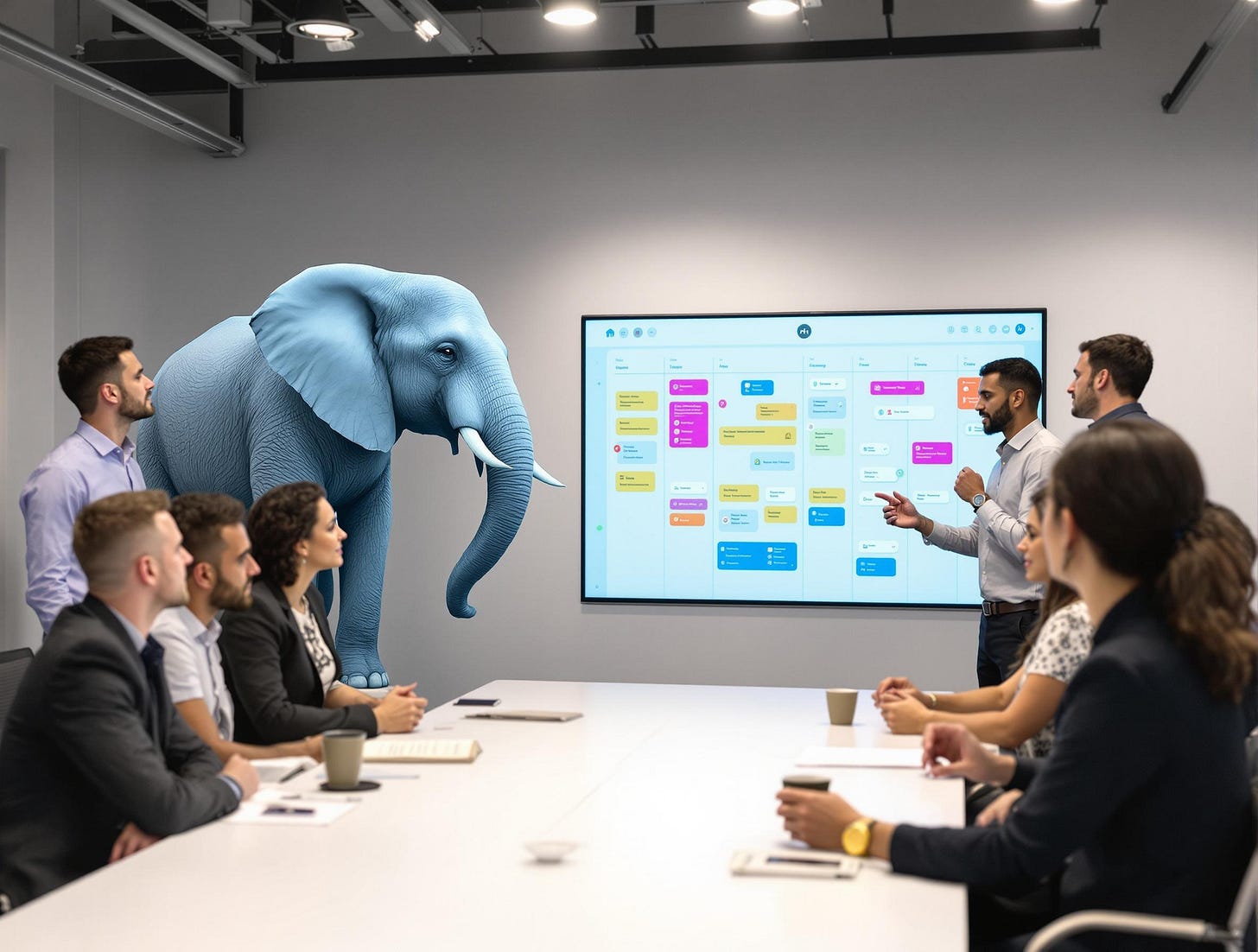The Invisible Elephants Dragging Down Your Projects 🐘
(and How to Spot Them)
A recent conversation with a scale-up CTO made me think. His team had just deployed a sophisticated digital Kanban board with all the bells and whistles. A true technological gem. But when I asked how they tracked their delivery times, his response gave me pause:
We prefer to focus on quality and innovation. Deadlines are too 'command & control' for our culture.
This statement reveals an elephant in the room that I've frequently encountered throughout my career: when we avoid talking about deadlines, it's often because we're avoiding seeing the real problems our teams face.
Lead Time as a Revealer 🔍
Let me share a concrete example. A CPO once told me how their view of lead time radically changed. Initially, they saw deadline tracking as administrative overhead. Then they realized it was actually a powerful dialogue tool.
When a feature planned for 2 weeks takes 4, it's not the delay that matters - it's what that delay reveals about our internal dysfunctions.
The paradigm is completely flipped!
The Art of Gemba Walk 🚶
This is where the Gemba walk becomes essential. This Lean Management practice involves physically going to the workplace ("gemba" in Japanese) to observe and understand the reality of work.
During these gemba walks, the "elephants" start to emerge:
Technical dependencies invisible in those beautiful architecture diagrams
Product specs that evolve silently, creating confusion
Friction in team collaboration
Temperamental test environments that "everyone knows about but no one fixes"
Validation processes creating bottlenecks
Kanban as a Dialogue Tool 🗣️
Kanban's true power extends far beyond its columns and sticky notes. Its transformative power manifests in the conversations it catalyzes, in those moments when a team stops, observes, and discusses a blocked ticket.
Far from being a mere reporting tool, Kanban becomes a revealing mirror, a dialogue support that enables:
Collectively identifying friction points
Making tacit assumptions explicit
Creating a safe space to discuss real problems
Aligning different perspectives (tech, product, business)
Transforming frustrations into improvement opportunities
From Visibility to Action 🎯
Beyond the traditional daily meeting that most of us already practice, experience shows we can push observation much further:
Transform our dailies into genuine moments of active observation: not just listening to updates, but truly "seeing" emerging patterns
Focus attention on stagnating tickets rather than progressing ones (yes, even if it's less comfortable!)
Create a culture where identifying a problem is seen as a victory, not a failure
Analyze emerging patterns rather than isolated cases: that delay that comes back every two weeks isn't a coincidence...
Document learnings to build collective memory and avoid reinventing the wheel every sprint
The key? Transform each observation into a learning opportunity and each blockage into a catalyst for progress. The daily isn't just an agile ritual; it's a goldmine of information about our teams' real health.
The Fundamental Lesson 🎓
Lead time is just a symptom, a signal. What really matters is what it reveals about the obstacles our teams face daily. Gemba walks aren't there to control, but to understand and support our teams.
In Practice
Here are some powerful questions to ask during your next Gemba walks:
Which tickets haven't moved for several days? Or even the oldest ones? (by the way, is the ticket's lead time visible on the board?)
What conversations aren't happening but should be?
Where are the friction zones that everyone knows about but no one addresses?
What are the recurring patterns in our delays? How can we identify them?
Do as I do, go to the field regularly (for me, it's at least 2 teams per month) and keep your eyes open: elephants are often where you least expect them, and they have a lot to teach us!
#Leadership #Lean #ProductManagement #Engineering #Innovation #Transformation #ContinuousImprovement #GembaWalks


